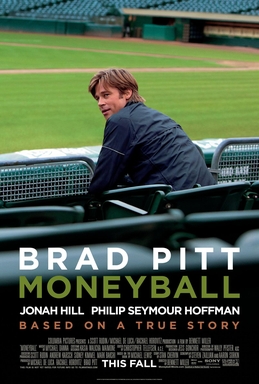Moneyball Sentencing
University of New Mexico School of Law Professor Dawinder Sidhu has an excellent article

Brad Pitt as Billy Beane
available at SSRN about the criminal justice’s system increasing use of statistics to predict a defendant’s future dangerousness. Professor Sidhu analogizes to the concept of Moneyball—or the practice of using batting statistics to predict a baseball player’s future performance (as popularized by Oakland As General Manager Billy Beane). In order to save money, reduce subjectivity, and increase accuracy, the sentencing community is increasingly relying on the rate of recidivism (fancy legal world for repeat criminal behavior) for groups in order to predict the rate of repeat criminal behavior for others who possess the same group characteristics.
As Professor Sindhu points out, this system is flawed for quite a few reasons:
First, it “premise[s] punishment on group characteristics which the individual possesses by accident of birth or cannot otherwise meaningfully change.” In other words, it is fundamentally unfair.
Second, people change. Predicting future behavior on the basis of the past behavior of others views humans as unchangeable and predestined, with little control over their behavior.
Third, some of these characteristics, like race, sex, national origin, and religion, are forbidden by the Constitution.
Interestingly, PLF CPIL attorney Wen Fa recently discussed Moneyball in the context of racial preferences. As he notes, Moneyball teaches us that we shouldn’t assume long-accepted platitudes to be true:
Many of the reasons for racial preferences, accepted as facts of life, are either highly debatable or simply not true. Contrary to popular belief, affirmative action programs do little to remedy past discrimination; current beneficiaries usually have nothing in common with past victims except for the color of their skin (and sometimes not even that). And even those beneficiaries are, in the long run, less likely to succeed than their counterparts. Further, the idea that diversity creates educational benefits has been weakened by studies showing that diversity manufactured through race-based preferences helps no one.
Applying Professor Sidhu’s article to this thought offers a further insight: while using certain factors in the college application process to admit those with a best chance of success or highest contribution to the college community may offer some benefits, there are some characteristics that just should be off the table. Race-based preferences benefit some and burden others based on a characteristic with which individuals are born and can do little to change, they view individuals as products of their race, and they raise serious constitutional concerns. To add to that, and as PLF has argued in many amicus briefs, racial-preferences highlight purely racial diversity, and thus emphasize racial difference; they reduce “race” to a very narrow concept; they undermine important achievements by minorities by causing some to believe that those achievements are the product of race-preference; they set up racial minorities for failure by admitting some to schools for which they are underprepared, and they therefore perpetuate sterotypes.
As Justice Thomas said in his dissenting opinion in Grutter, “The Constitution abhors classifications based on race, not only because those classifications can harm favored races or are based on illegitimate motives, but also because every time the government places citizens on racial registers and makes race relevant to the provision of burdens or benefits, it demeans us all.”
The same is true whether race is being used in schools, or in jails.


